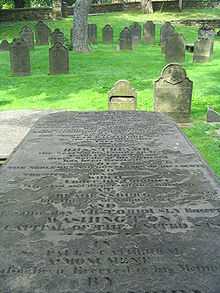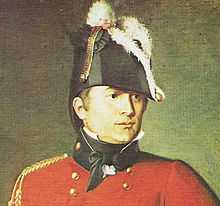Old Burying Ground (Halifax, Nova Scotia)
|
| |
 Nova Scotia | |
| Details | |
|---|---|
| Established | 1749 |
| Location | Halifax, Nova Scotia |
| Country | Canada |
| Coordinates | 44°38′36″N 63°34′22″W / 44.6434°N 63.5728°W44°38′36″N 63°34′22″W / 44.6434°N 63.5728°WCoordinates: 44°38′36″N 63°34′22″W / 44.6434°N 63.5728°W |
| Type | Closed |
| Owned by | St. Paul's Church (Halifax) |
| Number of graves |
12,000+ |
| Official name | Old Burying Ground National Historic Site of Canada |
| Designated | 1991 |
| Type | Provincially Registered Property |
| Designated | 1988 |
The Old Burying Ground (also known as St. Paul's Church Cemetery) is an historic cemetery in Halifax, Nova Scotia, Canada. It is located at the intersection of Barrington Street and Spring Garden Road in Downtown Halifax. It was founded in 1749, the same year as the settlement, as the town's first burial ground. It was originally non-denominational and for several decades was the only burial place for all Haligonians. In 1793 it was turned over to the Anglican St. Paul's Church. The cemetery was closed in 1843 and the Camp Hill Cemetery established for subsequent burials. The site steadily declined until the 1980s when it was restored and refurbished by the Old Burying Ground Foundation, which now maintains the site and employ tour guides to interpret the site in the summer. Ongoing restoration of the rare 18th century grave markers continues.

Over the decades some 12,000 people were interred in the Old Burial Ground. Today there are only some 1,200 headstones, some having been lost and many others being buried with no headstone. Many notable residents are buried in the cemetery, including British Major General Robert Ross, who led the successful Washington Raid of 1814 and burned the White House before being killed in battle at Baltimore a few days later.
The most prominent structure is the Welsford-Parker Monument, a Triumphal arch standing at the entrance to the cemetery commemorating British victory in the Crimean War. This is the second oldest war monument in Canada and the only monument to the Crimean War in North America. The arch was built in 1860 by George Lang and is named after two Haligonians, Major Welsford and Captain Parker, who both died in the battle at Redan in 1855 during the Siege of Sevastopol (1854–1855).
The Old Burying Ground was designated a National Historic Site of Canada in 1991.[1] It had earlier been designated a Provincially Registered Property in 1988 under Nova Scotia's Heritage Property Act.[2]
Notable interments
-
Richard Bulkeley (governor), d. 1800[1]
-

William Bowie (killed by Richard John Uniacke, Jr. in the last duel in Nova Scotia)
-

John Howe, father of Joseph Howe
- ^ While a display inside the St. Paul's Church (Halifax) states that Bulkeley is buried in the crypt, according to J. Philip McAleer, author of A pictorial history of St. Paul's Anglican Church, Halifax, Nova Scotia, the evidence that Bulkeley was buried in the church is circumstantial. This circumstantial evidence rests on the fact that he helped establish the church and was an active member in it for 51 years. Also Bulkeley is reported to have had the largest funeral ceremony ever to be in Halifax up to that date. Further, his wife Mary Rous has a headstone in the St Paul's Church Cemetery, while Bulkeley does not. Rev Hill, however reports that Bulkeley's grave is marked by a rude stone in St. Paul's Church cemetery, presumably close to the gravestone of his wife Mary Rous. (See Collections of the Nova Scotia Historical Society, Vol. 2, p. 69)
- William Ross
- Susan Cunard, wife of Samuel Cunard
- Mary Rous (wife of Richard Bulkeley; daughter of Naval officer John Rous)
- Charles Morris (1759–1831)
- Joseph Pernette - commandering of the militia in the Raid on Lunenburg, Nova Scotia (1782)
- Captain Benjamin James who died in the sinking of the HMS Tribune in 1797.
- Stone commemorating those who died in the Capture of USS Chesapeake has been removed to the foyer of St. Paul's church
References
- ↑ Old Burying Ground National Historic Site of Canada. Canadian Register of Historic Places. Retrieved 13 April 2013.
- ↑ Old Burying Ground. Canadian Register of Historic Places. Retrieved 13 April 2013.
External links
- The (Old St. Paul's) Burying Ground
- Halifax's Old Burying Ground
- Old Burying Ground Foundation
- List of People buried in cemetery
| ||||||||||||||||||



